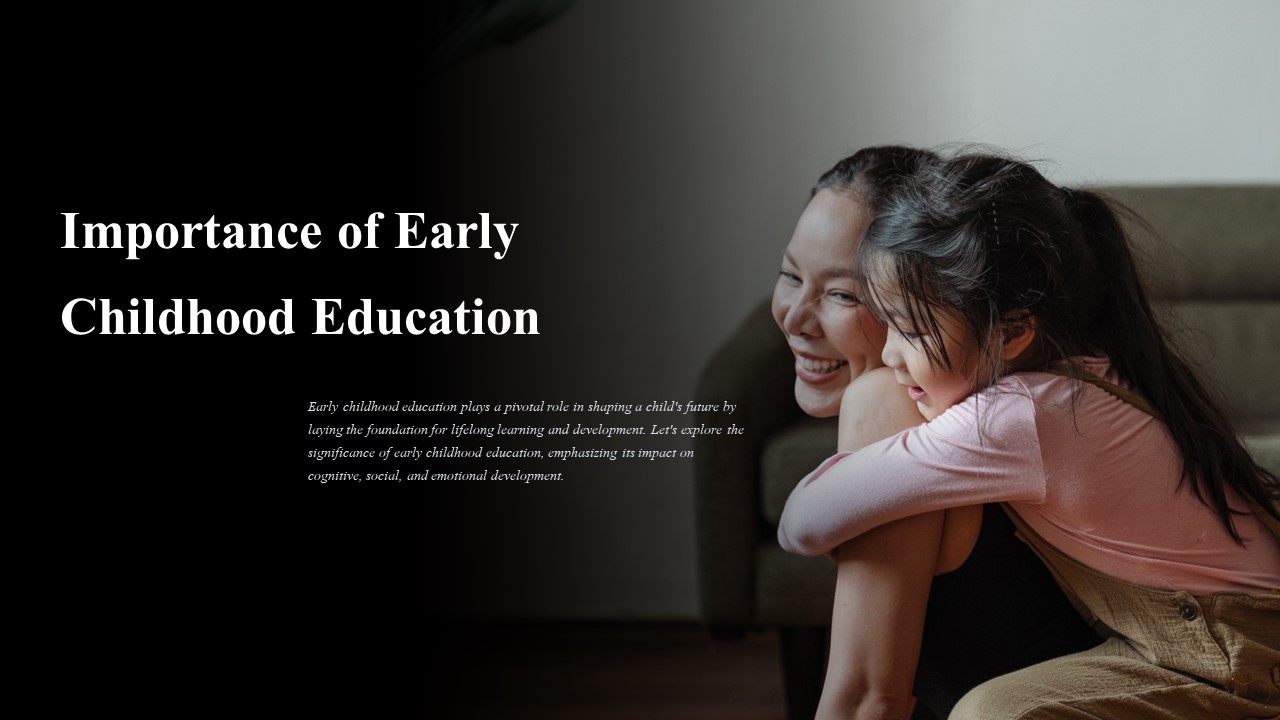Importance of Early Childhood Education - PowerPoint PPT Presentation
Title:
Importance of Early Childhood Education
Description:
We will explore the significance of early childhood education, emphasizing its impact on cognitive, social, and emotional development. – PowerPoint PPT presentation
Number of Views:5
Title: Importance of Early Childhood Education
1
Importance of Early Childhood Education
- Early childhood education plays a pivotal role in
shaping a child's future by laying the foundation
for lifelong learning and development.
Let's explore the significance of early childhood
education, emphasizing its impact on cognitive,
social, and emotional development.
2
Key Components of Early Childhood Education
- Early childhood education encompasses a range of
programs and services designed to support the
holistic development of children from birth to
eight years old. Child care services, delivered
by trained child care providers, play a central
role in this educational journey.
3
Child Care Services Child Care Providers
Child Care Services Child care services form a
crucial aspect of early childhood education, offer
ing a supportive environment for children
to thrive. These services are not only essential
for working parents but also contribute significan
tly to a child's overall growth.
High-quality child care programs provide
a structured curriculum that includes
age-appropriate activities, fostering cognitive,
language, and motor skills. Child Care
Providers The role of a child care provider is
instrumental in a child's early learning
experiences. These professionals are trained to
create a stimulating environment that encourages
exploration and curiosity. They play a crucial
role in identifying and addressing
developmental milestones, ensuring that each
child receives personalized attention.
4
- Early Childhood Education and Cognitive Developmen
t
Early childhood is a period of rapid brain
development, making it a critical time for
learning. Quality early childhood education
programs focus on activities that stimulate
cognitive growth, such as language development,
problem-solving, and critical thinking.
Language Development Language skills are
foundational for academic success and effective
communication. Early childhood education programs
employ interactive activities that promote
language development, including storytelling,
group discussions, and language-rich
environments. Exposure to a variety of words and
concepts during these formative years enhances a
child's vocabulary and communication abilities.
Problem-Solving and Critical Thinking Early
childhood education encourages the development of
problem-solving and critical-thinking skills
through hands-on activities and play-based
learning. These experiences contribute to the
development of a child's cognitive abilities,
setting the stage for future academic
achievements.
5
Social and Emotional Development in Early
Childhood Education
- Beyond cognitive development, early childhood
education plays a crucial role in shaping a
child's social and emotional well-being.
6
Social Skills Interaction with peers in a
structured setting fosters the development of
social skills. Through collaborative activities
and group play, children learn important lessons
about cooperation, sharing, and empathy. These
skills form the basis for building healthy
relationships later in life.
Emotional Resilience Early childhood education
provides a supportive environment for children to
explore and express their emotions. Child care
providers play a key role in helping children
identify and manage their feelings, promoting
emotional resilience. This foundation is
essential for navigating the challenges of
adolescence and adulthood.
7
Thank You!!
SITTERS CHILD CARE SERVICES
9th Floor, 902 - Room Number , Al Wahda City (1)
- Commercial Tower, Hazza Bin Zayed The First,
732 St, Al Nahyan, Abu Dhabi 22229 Contact
Us 971 02 222 2902info_at_sitters.ae Visit https
//sitters.ae/































